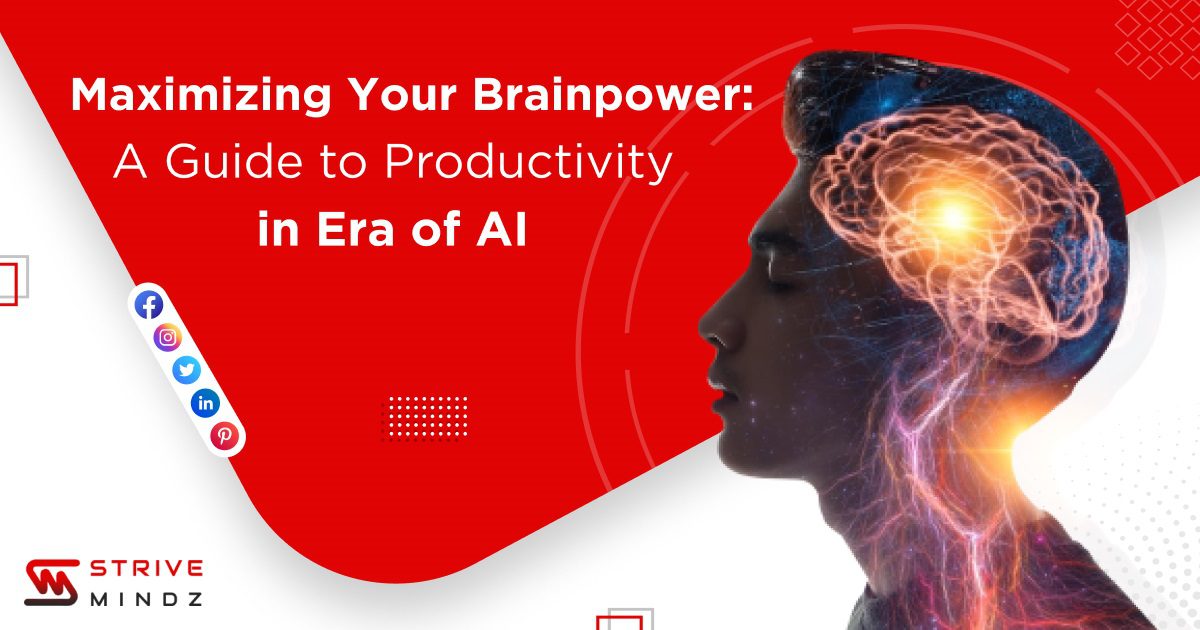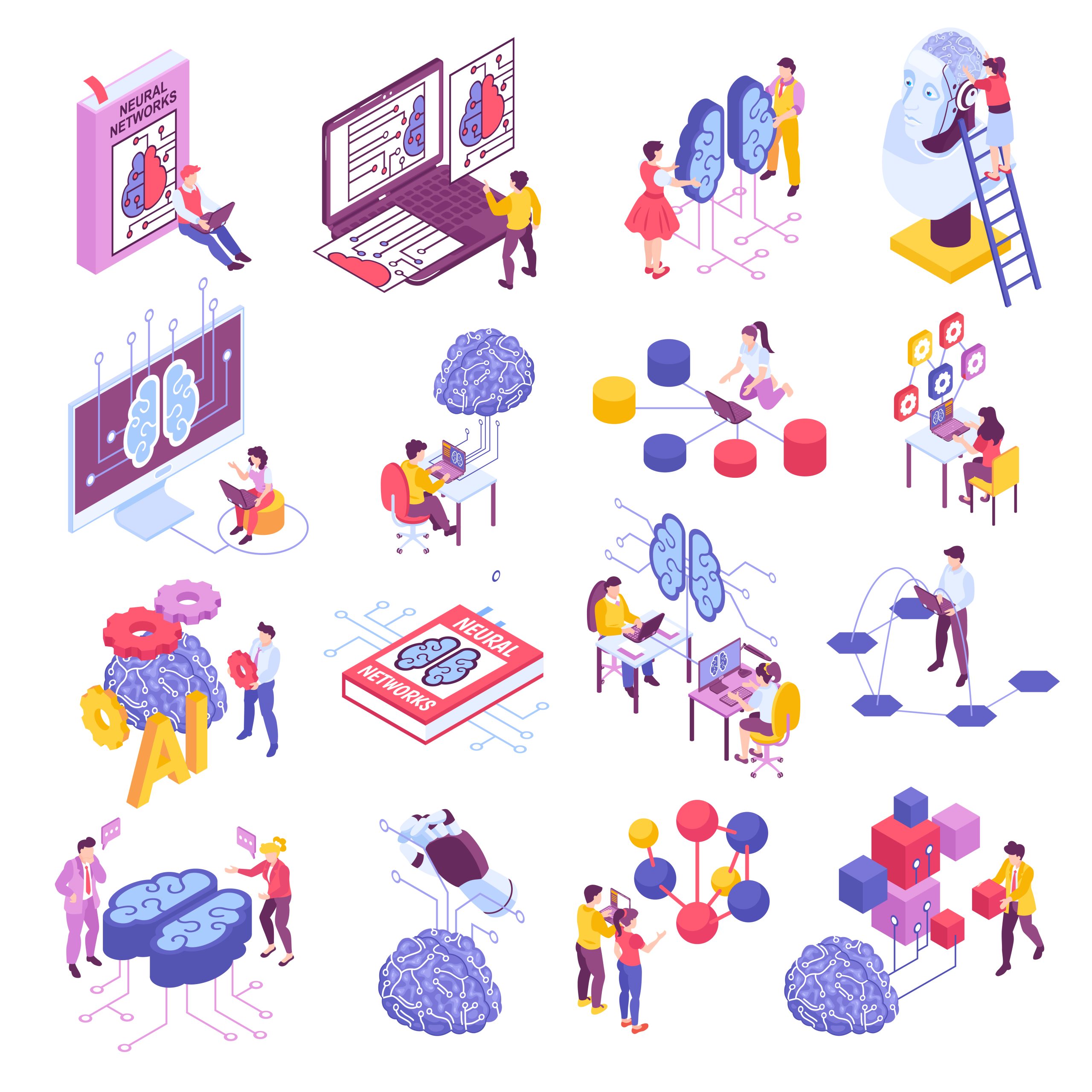Maximizing Your Brainpower: A Guide to Productivity in Era of AI

Overview: Productivity in the Era of AI
The increasing ubiquity of robots and computers in various domains necessitates a proactive response to maintain professional efficacy. As these machines continue to evolve and outperform traditional methods, individuals must enhance their cognitive capabilities and skill sets. Brain training, a systematic approach to cognitive development, emerges as a viable solution to address this challenge. By engaging in targeted brain training exercises, individuals can acquire and refine cognitive skills, enabling them to adapt to evolving technological landscapes.
This article delves into the mechanisms of brain training, providing insightful strategies and practical recommendations to create an effective brain training plan. Prepare to optimize your cognitive potential and surpass the performance benchmarks set by automated systems.
Understanding the Impact of Artificial Intelligence (AI) on Productivity
The Rise of Artificial Intelligence in the Workplace
Workplaces have witnessed a growing prevalence of artificial intelligence (AI) in recent. Companies are leveraging this technology to automate tasks and improve efficiency. AI is being harnessed in various capacities, such as virtual assistants and chatbots, to handle an extensive array of tasks, including managing customer inquiries and performing data analysis. The utilization of this technology has revolutionized the way businesses operate, providing them with a competitive edge and enabling streamlined operations. With AI, companies can reduce costs, increase productivity and improve customer satisfaction. With the continuous evolution of AI, we can anticipate witnessing further groundbreaking applications emerge in the workplace.
The Benefits and Limitations of AI for Productivity
Although AI offers numerous advantages in terms of productivity, it is not without limitations. A significant hurdle lies in guaranteeing the accuracy and dependability of this technology. Furthermore, certain tasks necessitate human intervention and creativity, particularly those involving problem-solving and decision-making. It is crucial to comprehend the capabilities and constraints of AI and combine it with human expertise to optimize its advantages.
The Importance of Brain Training in the Digital Age
In the digital age, cultivating productivity within your mind is crucial. With constant distractions and information overload bombarding our brains, maintaining focus and efficiency can be challenging. However, through brain training, you can acquire the essential skills and habits needed to thrive in today’s digital economy. By engaging in brain training, you can boost productivity, sharpen your focus, and enhance your capacity to learn and retain information effectively.
Understanding the Brain and Productivity Science

To train your brain for improved productivity, it is essential to understand the science behind productivity and the brain.
Gaining insight into the workings of your brain enables you to devise effective strategies that enhance its functionality and ultimately boost productivity.
How the Brain Works to Improve Productivity
The human brain is a complex and fascinating organ that can greatly influence and improve productivity. To gain a comprehensive understanding of its functionality, it is vital to recognize the intricate composition of the brain, comprising various specialized regions. Among these brain regions, the prefrontal cortex is responsible for important cognitive functions like decision-making and planning, while the amygdala plays a critical role in emotional response. Additionally, the hippocampus plays a vital part in memory formation, shaping our ability to store and recall information. By utilizing an effective organizational system for tasks or breaking down larger projects into small manageable pieces – activates prefrontal cortex function and people begin to focus more on their goals while minimizing distractions from other portions of the brain like the amygdala. Additionally, balancing activities that reduce stress levels, such as meditation or exercise – leads to improved cognitive performance by causing a decrease in cortisol production, which elevates stress hormones.
Therefore, understanding these processes can help one promote good practices on stimulating healthy dynamics in the brain resulting in better overall productivity levels.
The Role of Neuroplasticity in Brain Training
The concept of neuroplasticity holds immense importance in the realm of brain training, as it encompasses the brain’s remarkable ability to reorganize itself by forging fresh neural connections and pathways in response to experiences and learning. Brain training programs harness this potential to enhance cognitive functions like memory, attention, and multitasking. By engaging in targeted activities that build neural pathways related to specific skills or cognitive processes, individuals can enhance their mental abilities over time.
It’s worth noting that neuroplasticity is not limited to younger brains but applies throughout adulthood as well. This means that with consistent practice, even older individuals can develop new neural connections in response to training. The work done through brain training exercises reinforces the notion that ongoing stimulation keeps our minds agile throughout life – a vital component for successful aging, generally speaking.
Techniques to Train Your Brain with AI for Improved Productivity
Once you understand the science behind AI productivity and the brain, you can begin to implement brain training exercises to improve your skills.
The Basics of Brain Training Exercises
Brain training exercises can include activities like meditation, journaling and brain teasers. These exercises are designed to activate your brain and elevate your cognitive capabilities. Consistently participating in these exercises can enhance your focus, memory, and cognitive flexibility, all of which have a notable impact on increasing productivity.
Mindfulness Techniques for Improving Focus and Attention
Engaging in mindfulness practices, such as meditation and deep breathing, can contribute to enhancing your focus and attention span. Through consistent mindfulness practice, you can acquire the ability to manage distracting thoughts and maintain concentration on the present task.
Memory Techniques for Improved Learning and Retention
Memory techniques, such as association, repetition, elaboration, visualization, chunking and active recall, greatly enhance learning and retention. By connecting new information to existing knowledge, reviewing material at intervals, adding personal meaning, visualizing concepts, organizing information into manageable chunks and actively testing oneself, memory capabilities are significantly improved. These techniques extend beyond academic settings and can be applied to various contexts to enhance memory and facilitate long-term retention of information.
How to Use AI Technology in Boosting Brain Function
The relationship between technology and cognitive abilities has become a flourishing topic of interest, with researchers delving into the ways technology can enhance brain function. Research findings have demonstrated that technology holds the capacity to enhance various dimensions of cognitive abilities, encompassing memory, attention, and processing speed.
Brain Training Apps and Platforms
As people seek methods to enhance mental agility and cognitive function, the popularity of brain training apps and platforms has surged in recent years. These tools provide a variety of techniques, such as memory quizzes, puzzles and games, to stimulate different areas of the brain and enhance concentration, focus, and memory retention. While research on the effectiveness of brain training is still ongoing, initial findings suggest that these apps can indeed contribute to improvements in specific cognitive skills. However, it is important to acknowledge that not all brain training apps are equally effective, as their effects may vary based on individual goals. Furthermore, similar to any exercise or practice routine, consistency plays a pivotal role in reaping the benefits of these tools. Overall, brain training apps offer a convenient and accessible way for anyone looking to boost their mental power with exercises targeting specific cognitive domains such as working memory or visual-spatial functioning.
The Benefits and Risks of Using AI Technology for Brain Training
In recent years, the utilization of technology for brain training has gained popularity, with promising assertions of enhanced memory, cognitive function, and problem-solving abilities. While there are undoubtedly advantages to incorporating technology for such purposes, it is crucial to carefully assess the potential risks associated with it. One key risk is the overreliance on technology, which may lead to a lack of motivation or desire to engage in non-technological approaches to brain training such as reading or socializing. Another risk involves the potential for developing negative habits such as addiction and insomnia when using tech devices before bedtime. Despite these risks however, studies have shown that the benefits of using technology for brain training can be great. It offers adaptive learning experiences that can be personalized for each individual’s unique needs and preferences, making learning enjoyable and effective for all ages. When used responsibly and in moderation, incorporating modern-day technologies into our daily routines can offer significant advantages for improving cognitive abilities and overall mental health.
Daily Habits and Routines for a Productive Brain
Daily habits and routines are essential tools for maintaining a productive brain. Establishing a morning routine that prioritizes brain function can set the tone for a productive day. That means getting enough sleep, staying hydrated and exercising regularly.
Establishing a Morning Routine for Optimal Brain Function
Starting your day with a few mindfulness exercises or meditation can help calm the mind and improve focus. You can also kickstart your brain by drinking water and having a nutritious breakfast. Avoid the temptation to immediately check your phone or email, as this can disrupt your focus and set you up for a reactive day.
The Role of Exercise and Nutrition in Brain Function
Ensuring a healthy body through consistent physical exercise and appropriate nutrition is vital for achieving optimal brain function. Regular physical exercise can improve blood circulation to the brain, leading to enhanced cognitive function and decreased stress levels. Likewise, embracing a balanced diet comprising fresh fruits, vegetables, healthy fats, and protein can heighten focus and concentration, and provide enduring energy throughout the day.
The Power of Breaks and Naps for Improved Productivity
Evidence suggests that taking breaks and naps can have a significant positive impact on productivity. When we work for extended periods, our minds become fatigued, which can lead to diminished cognitive ability, reduced creativity and mistakes. Short breaks can help us maintain focus and sustain high-performance levels. Naps are also an effective way to recharge the brain quickly. Research indicates that short naps lasting between 20 and 30 minutes have been proven to considerably boost cognitive function, alertness, and mood. Moreover, they can effectively counteract the adverse effects of sleep deprivation, which is known to impede productivity.
Therefore, professionals should consider all the above-mentioned habits in their routines as a strategy to increase work efficiency and effectiveness while reducing the risk of burnout and mistakes.
Identifying Habits and Behaviors that Hinder Productivity

Common Productivity Killers in the Workplace
In the professional setting, it is crucial to possess awareness and acknowledgement of elements that can have adverse effects on productivity. Common productivity killers in the workplace often include distractions such as social media, email notifications and frequent interruptions from coworkers. Meetings that are unproductive or inefficient can also lead to decreased productivity and waste valuable time. Lack of organization and ineffective time management can cause individuals to feel overwhelmed and unable to focus on the tasks at hand. Additionally, stress and burnout from heavy workloads or unrealistic deadlines can lead to decreased motivation and energy levels.
Individuals need to identify these productivity killers and implement strategies such as eliminating distractions, prioritizing tasks, and taking breaks to combat these challenges and maximize overall efficiency in the workplace.
The Impact of Multitasking on Productivity
Multitasking, often perceived as a time-saving strategy, can hinder productivity. Studies reveal that it leads to lower-quality work, increased stress and reduced efficiency. The brain requires time to refocus when switching between tasks, resulting in a loss of momentum. Furthermore, attempting too many tasks simultaneously increases the likelihood of errors and missed deadlines. To optimize productivity, professionals should prioritize tasks and adopt a single-task approach.
Breaking down projects into smaller tasks and giving dedicated focus to each one yields superior results, reduced stress, and greater job satisfaction.
Self-Awareness and Assessing Personal Habits
Self-awareness and personal habit assessment are vital for professional growth. By engaging in introspection, we acquire valuable insights into our thoughts, emotions, and behaviours, enabling us to comprehend our interactions with others across various circumstances. This heightened self-awareness provides a solid basis for identifying our strengths and weaknesses, which in turn fosters targeted personal growth and development. This self-awareness serves as a foundation for recognizing our strengths and weaknesses, facilitating focused personal growth and development. Regularly assessing our habits ensures accountability and integrity, fostering professional development. Recognizing areas where we fall short or fail to meet expectations allows us to take proactive steps toward improvement. By nurturing self-awareness and continuously evaluating our habits, we become effective leaders and valuable team members, leading to overall success in all aspects of our lives.
Strategies for Minimizing Distractions in the Digital Age
Distractions are a major barrier to productivity in the digital age. To maintain focus, it’s important to minimize distractions and create a work environment that supports productivity. To minimize these distractions, individuals should adopt several strategies.
- Firstly, they need to identify the main sources of distraction and limit them. For instance, turning off notifications on phones or computers during work hours can help reduce interruptions.
- Secondly, people can schedule focused blocks of time for specific tasks while minimizing multitasking as this hinders attention span.
- Thirdly developing self-awareness and managing mental states is crucial in staying engaged with a task at hand as it requires prior focus disconnect from any unrelated event in the surrounding environment.
- Lastly, setting achievable goals for each day helps to prioritize the workload and gives an individual a sense of accomplishment that counts towards motivation levels.
Overall minimizing distractions entails discipline in most routine activities that come with our reliance on technology for enhanced productivity whilst balancing different responsibilities daily.
Maintaining Consistency and Discipline in Brain Training
Maintaining consistency and discipline in brain training refers to the regularity and dedication required to achieve significant cognitive improvements. When engaging in brain training exercises, it is crucial to remain consistent with your practice routine by dedicating a fixed amount of time each day or week. Discipline involves adhering to these routines despite encountering difficulty or hardship. Maintaining discipline means avoiding distractions and approaching each session with an unwavering focus on the training activity at hand. The key to success lies in setting realistic goals, monitoring progress over time and maintaining motivation throughout the journey towards improved cognitive abilities.
Additionally, incorporating healthy lifestyle choices such as physical exercise, nutrition, and quality sleep can augment these efforts for enhanced results. By holding oneself accountable for consistent practice and maintaining discipline, one can maximize their brain-training potential for long-lasting results that improve overall wellness and cognitive health.
Measuring and Tracking Brain Productivity Progress
![]()
To effectively enhance your brain’s productivity, it is crucial to consistently measure and monitor your progress over an extended period. This can help identify areas for improvement and keep you motivated in your goal to increase productivity.
The Importance of Tracking and Monitoring Brain Productivity
Tracking productivity can help you understand how different habits or routines are impacting your work. Are there certain times of day when you’re more productive? Are you able to focus better after a walk or exercise session? This information can be used to optimize your routine and maximize productivity.
Tools and Methods for Measuring Brain Productivity Progress
A plethora of tools and approaches are available for monitoring productivity, ranging from straightforward to-do lists to sophisticated productivity applications that track metrics such as task duration and completion count. Cognitive training programs, like Lumosity or BrainHQ, can also help measure and improve brain function over time. Experiment with different methods to find what works best for you. In a digital economy, improving productivity is essential for success. Through dedicated brain training and the implementation of productivity-enhancing techniques, you can surpass your goals and achieve remarkable accomplishments. It is crucial to prioritize breaks, integrate exercise and healthy habits into your daily routine, and track your progress as you advance. With unwavering commitment and the appropriate resources, you can effectively train your brain to maximize productivity and thrive in the digital era.
Summary
In an increasingly AI-driven world, honing our cognitive abilities becomes paramount for maximizing productivity. As the AI landscape continues to evolve, individuals must proactively augment their cognitive potential to adapt and thrive. A comprehensive grasp of AI’s impact on productivity, along with an understanding of its advantages and limitations, becomes crucial. Leveraging brain training techniques and targeted exercises can optimize cognitive function, leading to enhanced focus, memory retention, and accelerated learning capabilities. Exploring the underlying science of brain productivity, including the principles of neuroplasticity and the distinct roles of various brain regions, equips us with effective strategies. Integrating technology such as brain training apps and platforms can further amplify cognitive performance, though it’s vital to remain cognizant of the associated benefits and risks.
At Strivemindz, we understand the paramount importance of nurturing the mental well-being of our esteemed employees. We believe that establishing consistent daily habits and routines is key to nurturing a healthy mind. By prioritizing brain health through mindfulness practices, exercise, proper nutrition and effective management of distractions, we actively contribute to optimizing our cognitive state. Regular self-assessment, unwavering commitment and diligent progress tracking form the pillars of our approach, ensuring a continuous journey of personal improvement. Through these practices, we empower our team members to unlock their full potential, flourish in the dynamic digital era and unlock unprecedented levels of productivity. Moreover, by dedicating ourselves to ongoing brain training, we position ourselves to harness the boundless potential of AI technology to its utmost capacity.
We believe that by valuing and investing in our mental health, we not only elevate ourselves but also create a harmonious environment where each individual can thrive and contribute their best.
Together, we embrace the transformative power of self-appreciation and cognitive well-being, propelling ourselves toward success and pushing the boundaries of innovation in the digital landscape.

